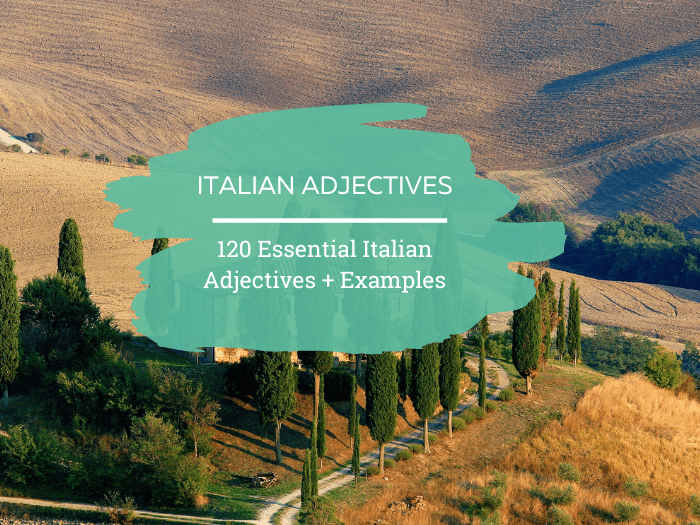
When you start learning Italian, one of the first things you'll likely learn about is Italian adjectives.
Adjectives are a group of words that describe the attributes of people, things, places or even situations.
To put it very simply, adjectives answer questions about how something is. That's why German-speaking kids call this class of words wiewort, or how-word before they learn the word “adjective”.
As for adjectives in Italian, you’ll be glad to see that in the examples below, there are a lot of words that you’ll recognize. That's because English words are often very close.
So get ready to boost your Italian vocab fast with this list of over 100 Italian adjectives!
By the way, if you want to learn Italian fast and have fun while doing it, my top recommendation is Italian Uncovered which teaches you through StoryLearning®.
With Italian Uncovered you’ll use my unique StoryLearning® method to learn Italian naturally through story… not rules. It’s as fun as it is effective.
If you’re ready to start, click here for a 7-day FREE trial.
Table of Contents
How Do Adjectives Work In Italian?

Before we get into the Italian adjectives list, let's take a look first at how to use them in a sentence.
Now, what is a bit different about Italian adjectives is that they change according to the gender and/or number of the thing they describe.
For example:
La rosa (the rose), a word of feminine gender, changes bianco (white) in this way:
- La rosa bianca (The white rose)
- Le rose bianche (The white roses)
But cavallo (horse), a masculine word, changes bianco only in the plural. That's because the base word, bianco, is masculine, as well:
- Il cavallo bianco (The white horse)
- I cavalli bianchi (The white horses)
So, do adjectives come before nouns in Italian? No! Unlike in English, in Italian you usually (though not always) put adjectives after the word they describe, like in the examples above.
Now for something that’s similar: some Italian adjectives have degrees, just like they do in English. There are three degrees: positive (good), comparative (better) and superlative (best).
The same in Italian looks like this:
- bene/buono (good) [either one works, here]
- meglio (better)
- migliore (best)
The opposite, bad, looks like this in its degrees:
- male (bad)
- peggio (worse)
- peggiore (worst)
There is, of course, also the Italian “issimo” you can put in the end of each of these base words, but that’s more like saying “very good” or “ver bad” rather than “better” or “worse.”
Anyway, let’s look at the list of 120 of the most common Italian adjectives and ways to use them in sentences. And get ready, because there are a whole bunch of them.
Descriptive Italian Adjectives
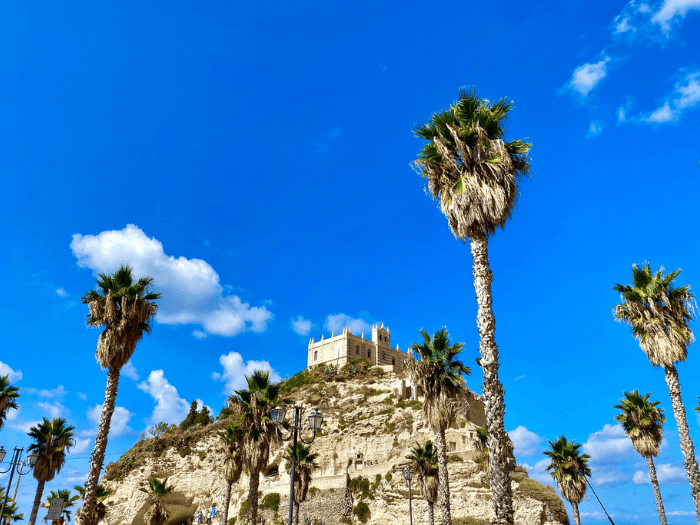
The most common type of Italian adjectives are descriptive ones. And they describe something in the most general terms. So that means you can't really put them in another category.
Bu these are must-know Italian adjectives for fluency as they're so common. You'll hear them everywhere and you'll want to start using them yourself. So let's go!
1. Artistico (Artistic)
- Devo dire che mio nipote è molto artistico. (I have to say that my nephew/grandson* is very artistic.)
*confusingly, nipote can be either, for whatever reason.
2. Banale (Banal)
- Ma che domanda banale! (What a banal [simplistic] question! )
3. Bello (Pretty, Nice)
- Che bella cosa é una giornata al sole! (How beautiful is a day spent in the sun!)
4. Brutto (Ugly, Bad)
- Ho vissuto un’esperienza bruttissima*, ieri. (I had [lived] a horrible experience, yesterday.)
You can use this “issimo/a/e/i” version with a whole number of adjectives if you want to emphasize them.
5. Buono (Good)
- Queste mele sono veramente buone. (These apples are really good.)
6. Caldo (Warm, Hot)
- Fa caldo oggi, non é vero? (It’s hot today, isn’t it [true]?)
7. Caro* (Expensive)
- La giacca è abbastanza carina, ma è anche carissima. (The jacket is cute enough, but it’s also very expensive.)
*There is no antonym or opposite to caro, meaning there’s no single word for “cheap” in Italian. That's unless you count economico, which isn't quite the same. Cara, caro, carissima or carissimo are also used to address people you like, as in ciao carissimo!
8. Cattivo (Mean, Bad)
You can also use this adjective to talk about food/flavours.
- Dai, non dobbiamo essere così cattivi. (Come on, can’t be that mean, now.)
9. Costruttivo (Constructive)
- La critica costruttiva può essere utile. (Constructive criticism can be useful.)
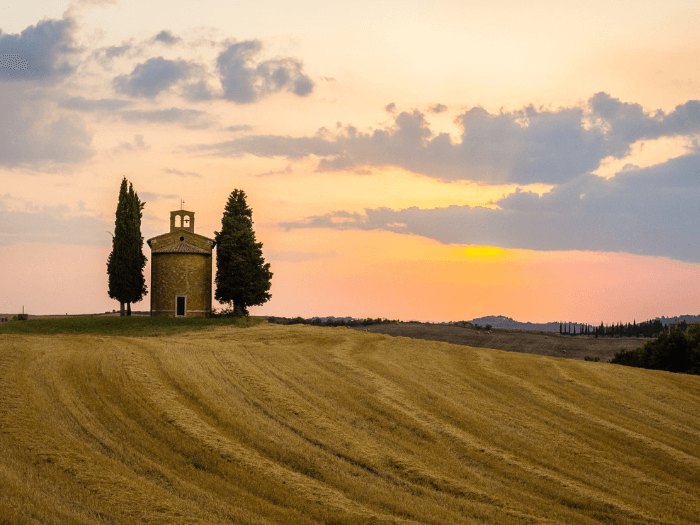
10. Creativo (Creative)
- Devo inventarmi una risposta creativa. (I have to come up with a creative response.)
11. Debole (Weak)
- Non riesco a sentirti, la connessione è molto debole. (I can’t hear you, the connection is very weak.)
12. Difficile (Difficult)
- Sarà una scelta difficile. (It will be a difficult choice.)
13. Discreto (Discreet)
- Devi essere sempre discreto con lei. (You must always be discreet with her.)
14. Disponibile (Available)
- Se hai bisogno di parlare, sono sempre disponibile per te. (I am always available to you if you need to talk.)
15. Divertente (Fun, Funny, Entertaining)
- É stata una serata molto divertente, saresti dovuto venire. (It was a very fun night, you should have come.)
16. Duro (Hard)
This means “hard”, but it's not often used as “difficult”.
- Tempi duri rivelano i veri amici. (Hard times reveal true friends.)
17. Efficace (Effective)
- Questa lavatrice é tanto efficace e economica. (This washing machine is very effective and economic.)
18. Elegante (Elegant)
- Era la donna più elegante del mondo. (She was the most elegant woman in the world.)
19. Facile (Easy, Simple)
- Non sarà facile per niente. (It won’t be easy at all.)

20. Falso (False, Untrue)
In this example, you put the adjective before the noun it describes. And even though it would work in the reverse, too, this is how Italians usually say this.
- Sono solo false speranze. (They are only false hopes.)
21. Famoso (Famous)
- Andiamo al ristorante di mio fratello, é famoso per la sua pizza. (Let’s go to my brother’s restaurant, it’s famous for its pizza.)
22. Forte (Strong)
- Sei una persona forte, ce la farai sicuramente. (You are a strong person, you’ll surely manage.)
23. Freddo (Cold, Freezing)
- Fa un freddo della madonna.* (It is incredibly cold.)
*della madonna means “very much”
24. Inadeguato (Inadequate)
- Mi sentivo più che inadeguato ad affrontare il problema. (I felt more than inadequate to deal with the problem.)
25. Interessante (Interesting)
- Ho letto un libro poco interessante. (I read a book that wasn’t interesting.)
26. Intimo (Intimate)
- Farò una festa intima per il mio compleanno quest’anno. (I will have a small party for my birthday this year.)
27. Leale (Fair, Loyal)
- Ho sempre detto che era un amico leale. (I always said he was a loyal friend.)
28. Legale (Legal)
- Mio nonno é legalmente cieco. (My grandfather is legally blind.)
29. Leggero (Light)
- É una cosa leggermente irritante. (This is a slightly irritating thing.)
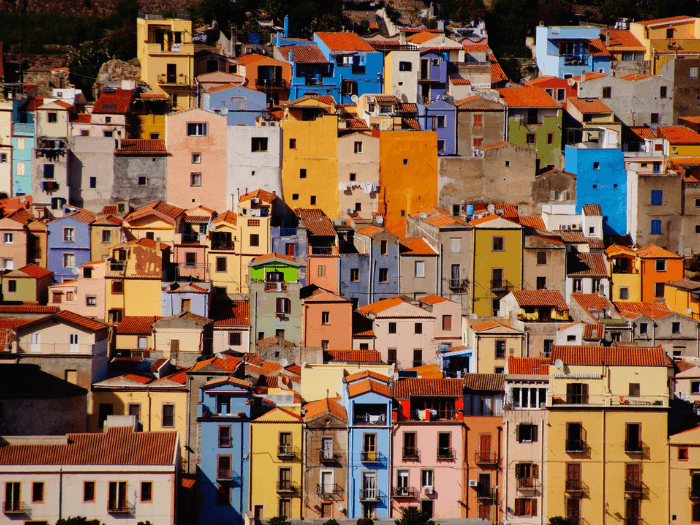
30. Letale (Lethal)
- Quella era una combinazione letale. (That was a lethal combination.)
31. Libero (Free)
- Soppongo che sarò libero verso mezzogiorno. (I presume I will be free around noon.)
32. Lieto (Happy)
You'll mostly see or hear lieto in the context below.
- Non per tutti c'è un lieto fine. (Not everyone gets a happy ending.)
33. Lontano (Far, Distant)
- Ci vediamo lì, se non è troppo lontano per te. (We will see each other there, if it’s not too far for you.)
34. Lucido (Lucid, Shiny)
- Quella ragazza ha i capelli belli lucidi. (That girl has nice, shiny hair.)
35. Magico (Magical)
- Ho trascorso una vacanza magica quest’estate. (I had a magical holiday this summer.)
36. Morbido (Soft)
- Per fare una crostata buona, il burro non deve essere morbido. (To make a good pie, the butter can’t be soft.)
37. Musicale (Musical)
- Non sono un gran talento musicale. (I am no great musical talent.)
38. Naturale (Natural)
- Vorrei un bicchiere d’acqua effervescente naturale*, per favore. (I would like a glass of naturally bubbly water, please.)
*in Italy, naturally fizzy water is very common. It mostly comes from volcanic sources in the south of Italy.
39. Negativo (Negative)
- Non dovresti essere sempre così negativa! (You shouldn’t always be so negative!)
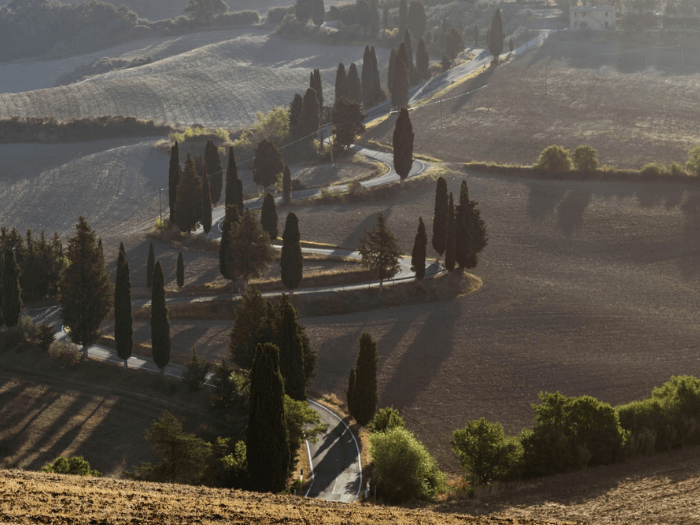
40. Noioso (Boring)
- É il film più noioso che io abbia mai visto in vita mia. (This is the most boring movie I have seen in my entire life.)
41. Nuovo (New)
- Mi sa che dovrò comprare una televisione nuova. (I guess I’m going to have to buy a new TV.)
42. Passivo (Passive)
- Lei mi dice sempre che sono troppo passivo. (She always tells me I am too passive.)
43. Pazzesco (Crazy, Nuts)
- Pazzesco! (Nuts!)
You use this word mostly on its own, as an exclamation, just like in English.
44. Pericoloso (Dangerous)
- Marco, vai piano che é pericoloso. (Marco, go slow as it’s dangerous.)
45. Pesante (Heavy)
- Che storia pesante! (What a heavy story!)
46. Pieno (Full)
- Questo posto è pieno zeppo. (This place is packed.)
Fun fact: pieno zeppo is a slang term that has its own hand sign. You touch your fingertips together repeatedly, palm up. This is, incidentally, also the sign for being scared.
47. Positivo (Positive)
- Dobbiamo rimanere positivi in tutta questa negatività. (We have to remain positive in all this negativity.)
48. Potente (Powerful, Potent)
- Mi serve una macchina più potente. (I need a more powerful car.)
49. Pulito (Clean)
- Com’è meravigliosa una casa tutta pulita. (How marvelous is an all clean home.)
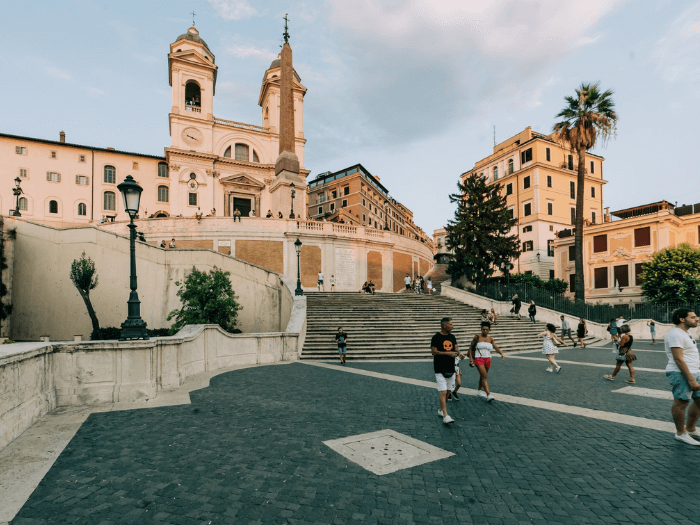
50. Reale (Real, Actual)
- A me, quelle perle sembrano piuttosto reali. (Those pearls look pretty real to me.)
51. Rotto (Broken)
- Il tuo telefono è rotto? (Is your phone broken?)
52. Uguale (Equal, Same As)
- Senti, é tutto uguale per me. (Listen, it’s all the same to me.)
53. Unico (Unique)
- l'unico modo per scoprire se è buono è provarlo. (The only way to find out if it’s good is to try it.)
54. Unito (Unified)
- Sarebbe molto più semplice se fossimo davvero uniti. (It would be much easier if we were really united.)
55. Usato (Used)
- É usato, ma come vedi, è in ottimi condizioni. (It’s used, but as you can see, in optimal conditions.)
56. Utile (Useful)
- Pensi che sarebbe utile chiamarla di nuovo? (Do you think it would be of use to call her again?)
57. Vecchio (Old (thing), Elderly)
- Puoi usare il mio cellulare vecchio, se ti serve. (You can use my old phone, if you need it.)
58. Vero (True)
- Non é vero. (That’s not true.)
59. Vicino (Close)
You can also use this word as a noun for “neighbour”.
- La mia casa é molto vicina a qui. (My house is very close to here.)
60. Vuoto (Empty)
- Ho lo stomaco vuoto, ho bisogno di mangiare qualcosa subito. (My stomach is empty, I need something to eat right away.)
Italian Adjectives To Describe A Person
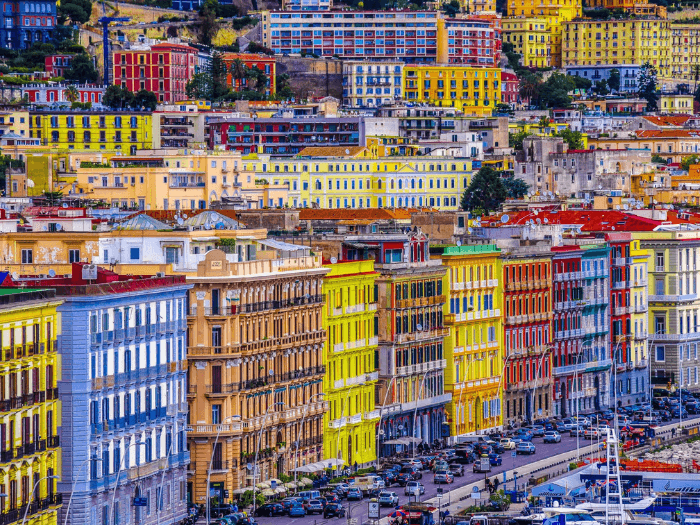
…or animals. While many of the Italian personality adjectives above can also be used for people or living things, the ones listed here are not usually used for things.
61. Adorabile (Adorable)
- Che cucciolo adorabile! (What a cute puppy!)
62. Arrabbiato (Angry)
- Sono arrabbiatissima con lui. (I am very angry with him.)
63. Arrogante (Arrogant)
- Come fai ad accettare che qualcuno sia così arrogante? (How can you accept someone being so arrogant?)
64. Bravo (Good)
- Sei un ragazzo molto bravo. (You are a really good guy/kid.)
65. Contento (Content)
- Sono contenta così come sono. (I am content the way I am.)
66. Daltonico (Colourblind)
- Ho scoperto di recente che Francesco é daltonico. Lo sapevi? (I found out recently that Francesco is colorblind. Did you know?)
67. Eccentrico (Eccentric)
- La mia vicina é una donna eccentrica. (My neighbor is an eccentric woman.)
68. Eroico (Heroic)
- É stato un atto piuttosto eroico! (It was a rather heroic act!)
69. Felice (Glad, Happy)
- Sono veramente felice per te. (I am really happy for you.)
70. Furbo (Sly)
- Sei furbo, lo sai? You’re sly, you know that?*
*Furbo doesn’t quite translate into English, being a sort of catchall term for someone who is clever, cunning and crafty. We all have that one furbo friend.
71. Gentile (Kind, Nice)
- Mario é un uomo molto gentile. (Mario is a very kind man.)
72. Giovane (Young)
- Non sei un po’ troppo giovane per fare cose del genere? (Aren’t you a bit too young to be doing such things?)
73. Grasso (Fat)
- Ho visto un cane grasso camminare sulla strada. (I saw a fat dog walking down the street.)
74. Ignorante (Ignorant, Stupid)
- Sei ignorante come una capra. (You are foolish like a goat.)
75. Incapace (Incapable)
- Sono emotivamente incapace di relazioni romantiche. (I am emotionally incapable of romantic relationships.)
76. Incoerente (Incoherent)
- Il suo discorso é stato incoerente. (His speech* was incoherent.)
*speech as in a speech, not the way you speak.
77. Magro (Skinny)
- Non mi piace il latte magro* nel caffe. (I don’t like skimmed milk in my coffee.)
*also called latte scremato, this is an exception to the rule above. But the magro here comes from the word for a skinny person.
78. Malato (Sick, Unwell)
- Ho mal di testa. Penso di essere malato. (I have a headache. I think I’m getting sick.)
79. Matto (Crazy, Mad)
- Ma sei matto? (Are you crazy?)
80. Nervoso (Nervous)
- Mi stai rendendo molto nervoso. (You are making me very nervous.)
81. Povero (Poor)
- Povero ragazzo, mi dispiace per lui. (Poor guy, I feel bad for him.)
82. Ricco (Rich)
- Credimi, tesoro, un giorno saremo ricchi e famosi. (Believe me, darling, one day we will be rich and famous.)
83. Taciturno (Taciturn)
- La mia nonna é una donna taciturna. (My grandma is a taciturn woman.)
84. Timido (Timid, Shy)
- Vieni qua, non essere così timido! (Come here, don’t be so shy!)
85. Triste (Sad)
- L’inverno sarà triste e lungo. (The winter will be sad and long.)
Colour Adjectives In Italian
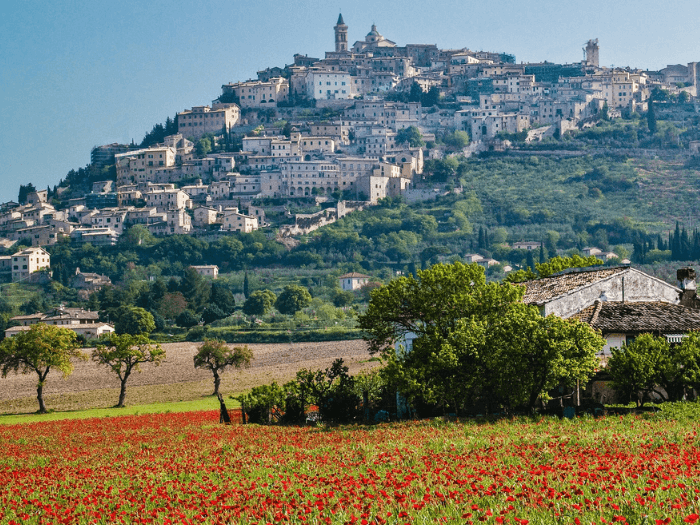
Want to talk about colours in Italian? Here are some terms to get you started.
86. Arancione (Orange)
- Che bel tramonto arancione. (What a lovely orange sunset.)
87. Bianco (White)
- Mi piacciono le rose bianche, ma non i tulipani bianchi. (I like white roses, but not white tulips.)
88. Blu or Azzurro (Blue)
- Il cielo blu e il mare azzurro, così dev’essere. (The sky blue and the sea blue, that’s how it’s got to be.)
89. Giallo (Yellow)
- Voglio un pappagallo giallo con le guance rosse. (I want a yellow parrot with red cheeks.)
90. Marrone (Brown), Sometimes Bruno or Castano
- Monica ha capelli castani e occhi marroni. (Monica has brown hair and brown eyes.)
91. Nero (Black)
- Mi piace vestirmi tutto di nero. (I like to dress all in black.)
92. Rosso (Red)
- Il rossetto rosso sta bene a tutte le donne. (Red lipstick looks good on every woman.)
93. Verde (Green)
- Mi piacerebbe avere gli occhi verdi. (I would like to have green eyes.)
Italian Measurement Adjectives
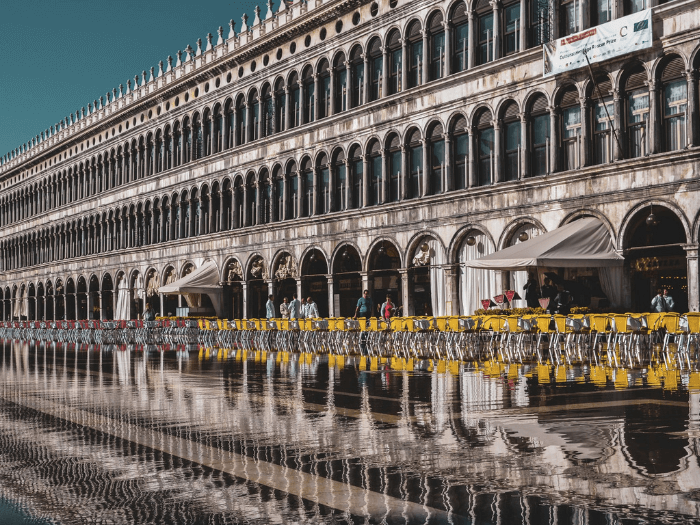
The next two sets of adjectives are all about shapes and sizes. So I'm sure you'll find them handy.
94. Corto (Short)
- Questa gonna é troppo corta. (This skirt is too short.)
95. Enorme (Enormous)
- Ho comprato un’anguria enorme al supermercato. (I bought an enormous watermelon at the supermarket.)
96. Gigante (Giant)
- Ci sono api giganti nel giardino. (There are giant bees in the garden.)
97. Grande (Big, Large)
- Non ti riconosco, sei diventato così grande ormai. (I don’t recognize you, you’ve gotten so big already.)
98. Grosso (Huge, Massive)
- Sarebbe stato un colpo grosso per me. (It would have been a big deal for me.)
99. Lungo (Long)
- Che giornata lunga. (What a long day.)
100. Piccolo (Small)
- Preferisco comprare le ciliegie piccole. (I prefer buying small cherries.)
Describing Shapes In Italian
101.Rettangolare (Rectangular)
- La finestra dovrebbe essere rettangolare. (The window should be rectangular.)
102. Rotondo, Circolare, Sferico (Round, Circular, Spherical)
- Disegnami una forma circolare. (Draw a circular shape for me.)
103.Quadrato (Square)
- Sto cercando il mio taccuino quadrato. (I am looking for my square notebook.)
Food-Related Italian Adjectives
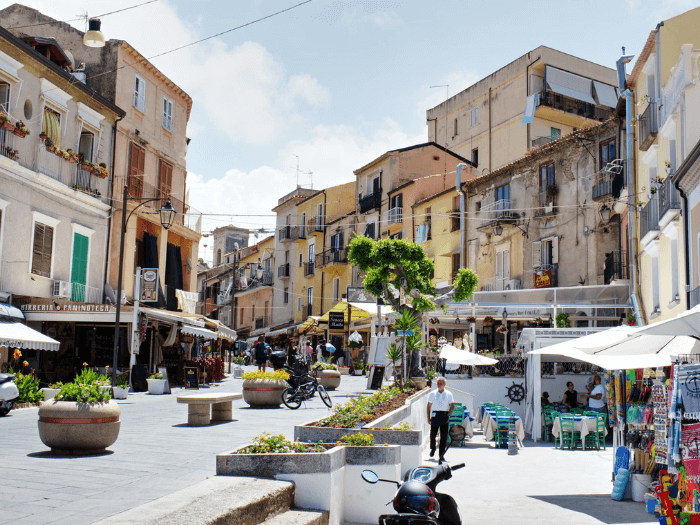
As an Italian learner, you're probably keen to discuss Italian cuisine, one of the best in the world! So here are some food adjectives to help you do that.
104. Amaro (Bitter)
- Questi cetrioli sono amari. (These cucumbers are bitter.)
105. Aspro, Acerbo, Acido (Sour, Acidic)
- Questa ricetta richiede limoni aspri. (This recipe calls for sour lemons.)
106. Delizioso (Delicious)
- Elisa, hai preparato una cena deliziosa. (Elisa, you’ve made a delicious dinner.)
107. Divino (Divine)
- Questo tiramisu è divino. (This tiramisu is divine.)
108. Dolce (Sweet)
- Niente zucchero, grazie, non mi piace il caffe dolce. (No sugar, thanks, I don’t like sweet coffee. )
109. Piccante (Spicy)
- I peperoni sono abbastanza piccanti, no? (The peppers are pretty spicy, right?)
110. Salato (Salty)
- L'acqua per la pasta deve essere salata come il mare. (The water for pasta has to be salty like the sea.)
111. Saporito (Flavourful)
- Ho mangiato cibo tanto saporito in India. (I ate very flavorful food in India.)
Proper Adjectives In Italian
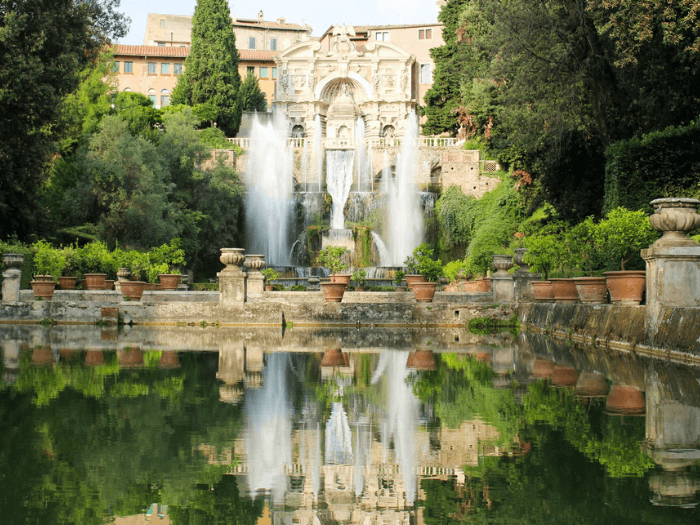
Next up are proper adjectives. These are like proper nouns (places, names etc), but in adjective form.
112. Americano (American)
- Tu vuoi fare l’Americano, ma sei nato in Italia. (You want to make like you’re American, but you were born in Italy.)
113. Genovese (From Genova)
- Il pesto genovese si fa con i pinoli. (Pesto from Genova is made with pine nuts.)
114. Italiano (Italian)
- Sono italiano vero, é ne sono fiero. (I am a real Italian, and proud of it.)
115. Tedesco (German)
- Le birre tedesche sono le mie preferite. (German beers are my favorite.)
Specifying Italian Adjectives
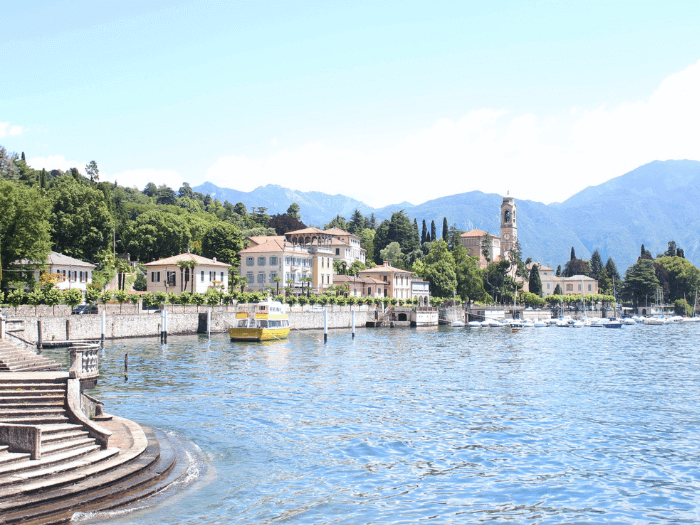
These are useful when you want to specify that you’re talking about a certain person, or object.
116. Altro (Other)
- Possiamo vederci un altro giorno? (Can we see each other on another day?)
117. Differente, Diverso (Different, Not The Same)
- Stai parlando di due cose diverse. (You are speaking of two different things.)
118. Quello (That one)
- Vorrei quella macchina rossa. (I would like that red car.)
119.Questo (This one)
- A questo punto, non ne sono sicura. (At this point, I am not so sure [of it].)
120. Stesso (Same)
- Per pranzo, mangio la stessa cosa ogni giorno. (For lunch, I eat the same thing every day.)
Italian Adjectives FAQ
What are the 30 examples of adjectives?
Here are 30 common adjectives in Italian:
1. Bello (beautiful)
2. Brutto (ugly)
3. Alto (tall)
4. Basso (short)
5. Magro (thin)
6. Grasso (fat)
7. Vecchio (old)
8. Giovane (young)
9. Ricco (rich)
10. Povero (poor)
11. Felice (happy)
12. Triste (sad)
13. Forte (strong)
14. Debole (weak)
15. Veloce (fast)
16. Lento (slow)
17. Caldo (hot)
18. Freddo (cold)
19. Grande (big)
20. Piccolo (small)
21. Lungo (long)
22. Corto (short)
23. Interessante (interesting)
24. Noioso (boring)
25. Gentile (kind)
26. Arrabbiato (angry)
27. Amichevole (friendly)
28. Coraggioso (brave)
29. Intelligente (intelligent)
30. Pigro (lazy)
How do you describe someone's personality in Italian?
To describe someone's personality in Italian, use adjectives like:
Simpatico/a (nice)
Estroverso/a (outgoing)
Introverso/a (introverted)
Onesto/a (honest)
Creativo/a (creative).
Example: Lui è simpatico e molto creativo. (He is nice and very creative.)
Which adjectives come first in Italian?
Most adjectives in Italian come after the noun, but some, like bello (beautiful), grande (big), and bravo (good), can come before the noun for emphasis or stylistic reasons.
Example: Una bella giornata (A beautiful day).
Can you give me a list of adjectives?
Here’s a brief list of adjectives by category:
Appearance: bello (beautiful), brutto (ugly), magro (thin)
Size: grande (big), piccolo (small), lungo (long)
Personality: simpatico (nice), gentile (kind), pigro (lazy)
Feelings: felice (happy), triste (sad), arrabbiato (angry)
Quality: forte (strong), debole (weak), intelligente (intelligent).
These can be used with the correct gender and number to match the noun.
Start Using Italian Adjectives
So there you have it, 120 Italian adjectives to describe everything from people to food.
As you can see, these words will help you to speak Italian more fluently and accurately.
You don't have to memorise this list though. The good news is that these adjectives are common. So you'll hear and see them all the time.
So look out for them as you listen to Italian podcasts. Or read Italian books and short stories in Italian. As you immerse yourself in Italian, you'll master them in no time!
And if you still need a bit of help with Italian then my course, Italian Uncovered, will teach you through story, not rules. Get your free 7-day trial here.

Olly Richards
Creator of the StoryLearning® Method
Olly Richards is a renowned polyglot and language learning expert with over 15 years of experience teaching millions through his innovative StoryLearning® method. He is the creator of StoryLearning, one of the world's largest language learning blogs with 500,000+ monthly readers.
Olly has authored 30+ language learning books and courses, including the bestselling "Short Stories" series published by Teach Yourself.
When not developing new teaching methods, Richards practices what he preaches—he speaks 8 languages fluently and continues learning new ones through his own methodology.









































